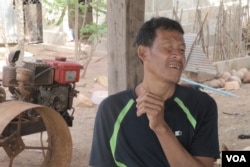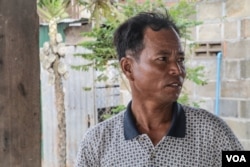Cambodia’s ruling party is preparing for local elections to be held in May, but few Cambodians appear to be paying much attention to what has become largely a sideshow after the Cambodian People’s Party banned the main opposition two years ago and handed their jobs to loyal officials.
In Treuy Koh commune, Kampot province, five seats are up for grabs. Pov Son, the CPP commune chief for the past 20 years, believes his colleagues will all vote for the ruling party, adding, “They have to vote for CPP since they are the members of CPP.”
More than 4,100 constituencies are being contested in total across the country’s 25 regions, but only the incumbent 11,500 commune councilors, many of whom were installed by the CPP in 2017, are eligible to vote.
Prior to its dissolution by the Supreme Court, the former opposition Cambodia National Rescue Party held about 43 percent of the seats. Since then hundreds of former opposition officials defected to the CPP amid reports of coercion.
The CNRP had majorities in some regions, including the capital Phnom Penh, where it held 53 percent of the council positions. While councilors have some degree of devolved influence, they are not empowered to the extent that district and provincial officials are to form and implement policy.
“The councilors from provinces, cities, and districts have the power to set up plans, meet to set up plans for the governor to implement,” he said.
Chea Chiv, a former CNRP official from Battambang province, said the election will have no legitimacy following his party’s dissolution.
“It is a one-party election and incomplete. There is no need to have an election, wasting the national budget. [The CPP] can set it up without an election,” he said, adding that the ruling party’s actions were “like riding a wild horse handsfree”.
For many, this election will be another reminder of the CPP’s consolidation of power since 2017. Prime Minister Hun Sen launched an extensive crackdown on independent media, civil society activists and the opposition party ahead of the national election in 2018, which critics labeled “the death of democracy.”
But Cambodians are largely indifferent to the vote, given that they have no say in the outcome.
Soth Pov, 48, a laborer at a local salt producer, said he had not heard there would be an election. “When is the election?” he asked.
Since the crackdown on dissent, a climate of fear has spread in rural Cambodia as ruling party officials grew increasingly paranoid of suspected plots to oust Hun Sen, labeling opposition party supporters terrorists.
Chhaom Chanthy, another Treuy Koh villager, remains wary of discussing politics in public.
“I am afraid of talking about this,” he said when asked about the election. “I am just a normal citizen; it is hard to talk.”
However, he said he wants to see the ideas of the country’s leaders challenged.
“It [Cambodia] can’t progress if there is only one [party],” he said.







